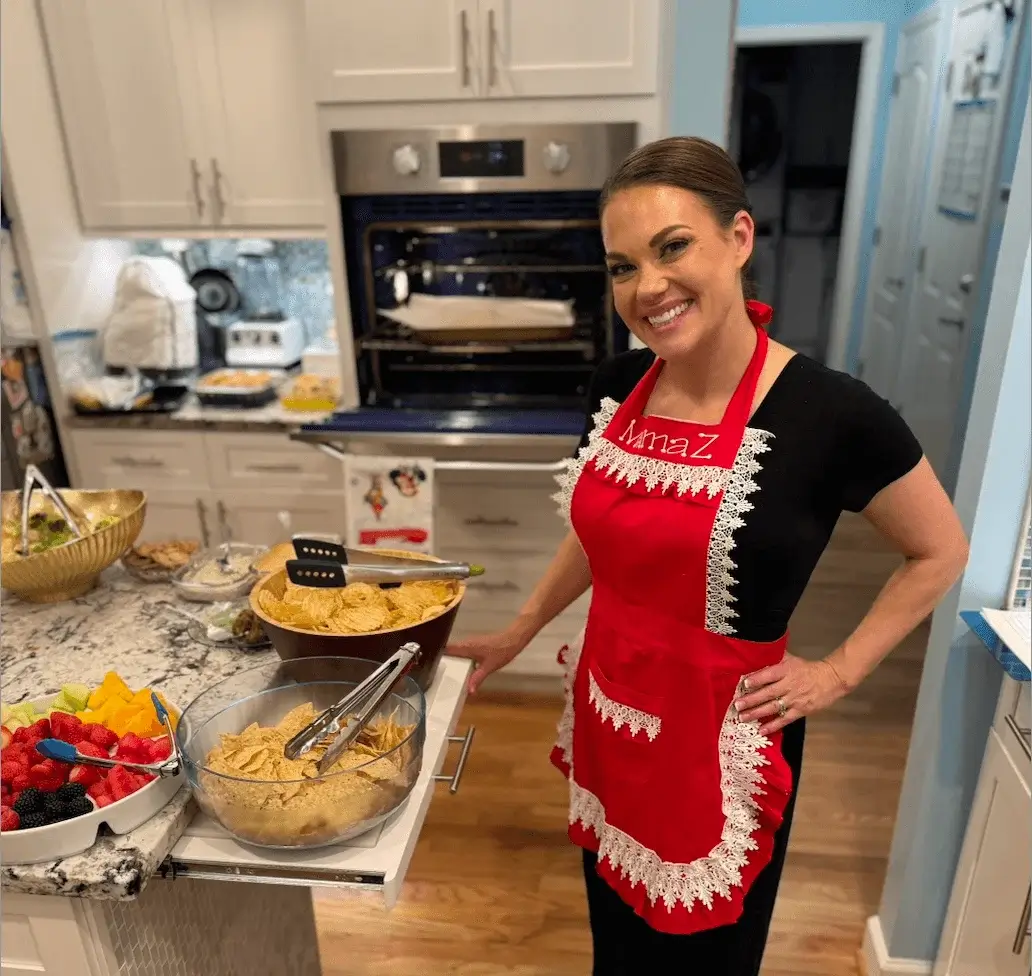Though we grow quite a bit of our food, there are a lot of items that we still need to purchase at the grocery store. I know what a challenge it can be to navigate the aisles and make the right choices for your family.
You want to buy the best foods, but what ARE the best foods and how can they be affordable?
Once you learn how to grocery shop and unravel the mysteries of buying healthy foods on a budget, however, you’ll be able to provide the people you love most with wonderful, nutritious foods without painfully overspending.
Table of Contents
Don’t Break the Bank on Health Foods
The “health food” market has become a racket over the years. If you add the words “healthy” or “natural” to a product label, people think that they are made of gold and stores seem to price them to match that idea. This can be so discouraging to those who want to eat a healthier diet or feed healthy foods to their families.
The pricing on these items isn’t budget-friendly for a lot of people…and guess what? Much of that so-called “health food” you are loading into your shopping cart probably isn’t even that good for you!
Instead of buying these foods that are super inflated in price, there are so many more affordable, nutritious options that you can purchase for your family. It is absolutely possible to eat wonderful, healthy foods every single day and buy them from the supermarket without breaking the bank.
You just need to learn a few simple tips and tricks that will help you keep your budget within control and how to make the right choices as you navigate the aisles of the grocery store.
We’ll help you understand what to purchase, what to avoid, and how to grocery shop in a way to make the most of your grocery budget, feeding yourself and your family the nutritious foods that God intended for us all to enjoy!
Mama Z’s Full-Length Shopping Tour
We recorded this shopping tour for folks that bought The Essential Oils Diet so they could the most out of our book, and we wanted to make sure our blog readers didn’t miss out.
Ready to make the most of your healthy food shopping list and learn how to grocery shop with health and savings in mind? Follow us as we walk the aisles of our neighborhood natural health food store with local Natural Living Family friends, and find out what we include on our shopping list and what influences our choices.
Interested in using essential oils to lose weight, curb cravings and get on the road to healthy living. The Essential Oils Diet is a Lifestyle Transformation book that will walk you through how we live and eat and do our best to honor God with our bodies!
Is Organic Really Necessary?
Some people mistakenly believe that in order for a food to be healthy, it must be organic. While there are some foods that you should always purchase with the organic label, there are others where this simply isn’t necessary. Organic fruits and vegetables are absolutely important when you are shopping for certain foods, but for others, it is really a giant waste of your money to seek out organics.
The Dirty Dozen and the Clean Fifteen
When you are learning how to grocery shop on a budget, it is important to understand what fruits and veggies should be purchased organic and which ones organic isn’t necessary. The easiest way is to learn the “dirty dozen” and the “clean fifteen”. These are lists of the fruits and vegetables that are most heavily treated with pesticides and chemicals and those which are the least likely to cause you to consume dangerous chemicals and components. Print them out and keep them in your purse or wallet or save the list in your phone so you can check it as you grocery shop!
The Dirty Dozen includes:
1. Strawberries
2. Spinach
3. Nectarines
4. Apples
5. Grapes
6. Peaches
7. Cherries
8. Pears
9. Tomatoes
10. Celery
11. Potatoes
12. Sweet bell peppers
The Clean Fifteen includes:
1. Avocados
2. Sweet corn
3. Pineapples
4. Cabbages
5. Onions
6. Sweet peas
7. Papayas
8. Asparagus
9. Mangoes
10. Eggplants
11. Honeydew melons
12. Kiwis
13. Cantaloupes
14. Cauliflower
15. Broccoli
Healthy Grocery Shopping on a Budget
In our grocery shopping tour, we take you on a trip to one of our favorite grocery stores and share some of our favorite products, explain what to look for as you’re shopping and reading labels, and teach you how to grocery shop for healthy foods while staying within your family’s grocery budget.
1. Shop in Season. Shopping in season is one of the best ways to make the most of your grocery shopping money. God had a plan when He created the wonderful fruits and vegetables that we are able to eat. Think Biblically when you grocery shop and look for the foods that are in season. These foods are always the most affordable and it will help you to keep a great variety in your diet that will have you feeling healthier and happier.
2. Save Money With a Meal Plan. Creating a meal plan can be a great help to making sure that you keep your budget in check. You can make a more accurate list, as you will know what you need when you walk into the store, plus this will also help you avoid impulsively grabbing whatever happens to look good on the shelves as you walk through. If you’ve picked up a copy of The Essential Oils Diet book, be sure to sign up here for the free bonuses which include two meal plans to help simplify your life.
3. Shop with a List. This might be one of the most commonly mentioned tips when people are learning how to grocery shop, but it is really that important. Not only will it save you money by helping to avoid impulse buys, but you will also avoid forgetting items that you need to make the meals you have planned. You can get the job done in one trip and save time, too!
4. Use Online Markets to Save. Spend some time searching online stores. Not only can you save money on your grocery budget, but you’ll get back the time that you would have spent in the store shopping for those items. Online shopping is a total win-win! We have some of our favorite items in our healthy products post.
5. Shop in season! God created growing seasons for a reason. By shopping things that are currently in season in your area, you’ll save money as these are typically more affordable, you’ll bring variety to your diet, and give yourself even more of the nutrients you need.
6. Buy real foods, not supplements. Supplements like vitamins and powders can be very, very expensive and really are not at all necessary if you are eating a diet that is rich in the foods that your body needs. Get your nutrients from the foods you eat and you won’t need to waste money on supplements unless they are prescribed for you by a medical professional.
7. Test Ingredients for Yourself. Test out a variety of products to find the ones that work best for you and your family. You may find that combining, for example, two kinds of gluten-free flour can help you to find a more affordable solution or improve the taste and texture of your cooking.
8. Store Food Wisely. Always store things like spices, flour, sugar, and other things in glass for the best shelf life. This will also keep the dangerous chemicals from plastics from leaching into your spices and other ingredients.
9. Keep Herbs Fresh Longer. Measure herbs and spices away from the stove instead of shaking things into the pot directly. This can cause moisture to be trapped in the container and encourage mold to grow, giving you a shorter shelf life and causing you to waste a lot of money on expensive, healthy spices and herbs.
10. Buy Frozen Foods for More Savings. Frozen food can be a wonderful resource. You don’t have to buy fresh all of the time. There are some wonderful organic brands of frozen foods out there, plus frozen fruits and veggies are a fantastic choice when fresh isn’t available or affordable. Look for flash-frozen items, as these will have minimal nutrient loss as they were frozen quickly after being picked. Stay away from canned foods, however, because BPA from the cans can leach into your food.
Shop Smart Not JUST for Savings
Smart shopping goes a lot further than buying the least expensive foods in the grocery store. Your healthy food shopping list should contain not only affordable choices but foods that are smart choices for your body, as well. Avoiding chemicals and GMOs is so very important to your overall health!
The chemical preservatives that you’ll find all over the aisles of your grocery store in processed foods can do a lot of damage to your body. Even the produce and fresh meat sections aren’t without their dangers. Chemical pesticides used to “protect” fruits and veggies from insects, genetically modified feed sources on meat, and chemical fertilizers become a part of your diet, too.
So why is this so terrible? If you think about it, it is quickly apparent that you’re ingesting poisons! The toxic compounds in these foods could make you sick – or worse – if you ingest them in larger quantities and over time, they can build up in your body and cause the same detrimental issues. Genetically modified foods can disrupt the hormones in your body and create changes in your own DNA. We go more in depth on this in our book, The Essential Oils Diet, explaining how all of these compounds affect our overall health and even make us gain and retain weight!
Interested in using essential oils to lose weight, curb cravings and get on the road to healthy living. The Essential Oils Diet is a Lifestyle Transformation book that will walk you through how we live and eat and do our best to honor God with our bodies!
Healthy Shopping List for Weight Loss
As you are making your healthy food shopping list, the bulk of your list should come from eight specific categories. The “Essential Eight” foods from our book, The Essential Oils Diet are the base for a healthy diet that will help you to begin to heal your body from the toxic components that you have been ingesting, plus provide some wonderful meals for yourself and the people you love.
These foods are rich in bioactive compounds that are restorative and nutrient-filled, promoting health and helping to avoid inflammation, insulin resistance, and other detrimental health issues.
- Seeds – As seeds are the embryonic version of plants, they are packed full of wonderful compounds, including omega-3 and omega-6 fatty acids, vitamins, and minerals. Chia seeds, hempseed, cacao seeds, and flaxseed are just a few of our favorites.
- Healthy Fats and Oils – All oils and fats are not bad for you and, in fact, they have an important purpose in your diet. Extra-virgin olive oil and avocado oil have healthy levels of mono-unsaturated fats that are important to a healthy diet. We get our olive-oil from the fresh-pressed oil club for the best flavor and value. (1) Real butter, in moderation, also can provide important dietary fat that your body needs to thrive.
- Fruits – Fruits of all kinds are packed with vitamins, nutrients, and other bioactive compounds that will make your healthy food shopping list rich with delicious flavor. Berries are especially important, with fiber-rich seeds and flavonoids. Avocados are a great choice, as well, being a great source of fiber and vitamin K, among other wonderful benefits.
- Cruciferous Veggies – The anti-inflammatory, cancer-fighting properties of cruciferous veggies are just a couple of the wonderful reasons these should make your healthy food shopping list. Broccoli, cabbage, kale, spinach, and arugula are just a few of the delicious veggies that are included in this category.
- Nuts – High in protein and nutrients, nuts are a wonderful addition to your daily menu. Include almonds, walnuts, and other tree nuts on your shopping list, unless allergies are an issue. They make a great snack that provides plenty of wonderful benefits, including omega-3 and omega-6 fatty acids, plus help to curb your appetite and prevent overeating.
- Legumes – Beans, peas, lentils, peanuts, and cashews are some of the most wonderful legumes that you can include in your diet. The dietary fiber and antioxidants in these wonderful little powerhouses provide so many great benefits for your body.
- Wild-Caught, Cold-Water Fish – Wild-caught, cold-water fish is a wonderful source of protein for your diet. Choosing wild-caught fish ensures that they have consumed a more natural diet, and cold water varieties have a high level of essential omega-3 fatty acids that are important for your body.
- Teas – Though purified water is always the best choice when you’re thirsty, teas can bring some flavor and also some great benefits to your menu. Matcha green tea, for example, can help to protect your DNA from damage. Herbal teas, like rooibos, holy basil, and senna, also have wonderful benefits, such as regulating the gut, boosting metabolism, and more.
These are just a few of the amazing keys to unlocking how you can navigate the grocery store to make the healthiest choices for your family while staying in your budget.
- https://freshpressedoliveoil.com/c/APNLF005_O_REF_LE_Q220/tj/f536bd12dc7448f6b3213afb7de05ea1











